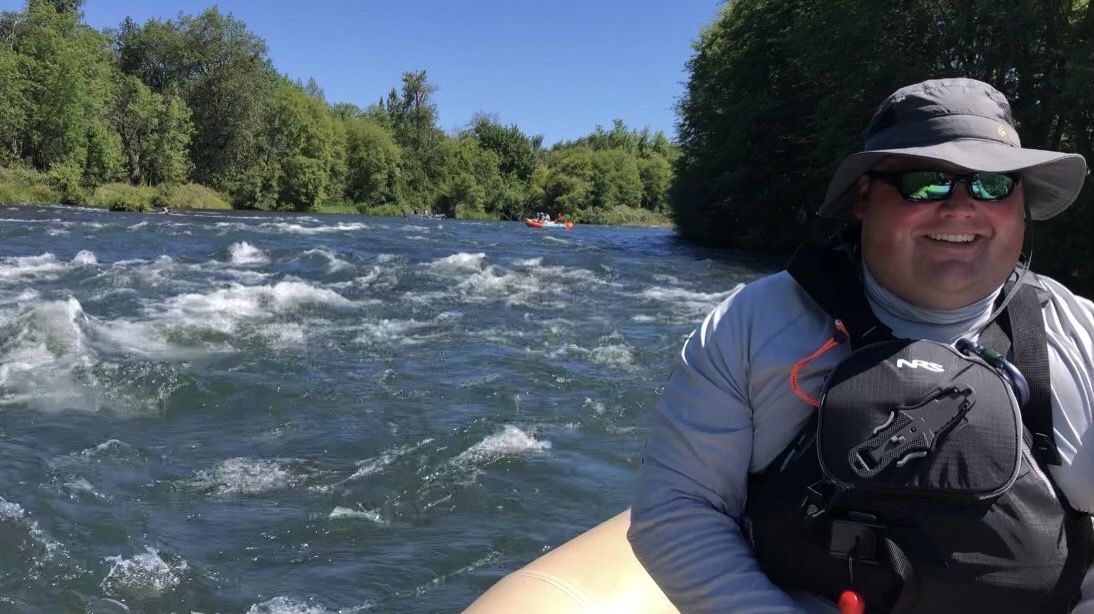Meet The Marine Board's New Boating Safety Program Manager (Photo) - 05/18/22
The Oregon State Marine Board experienced long-time staff retirements this year, who left the decks clean, and the lines well dressed for new crew members to replace them. In March, Brian Paulsen was selected as the agency’s Boating Safety Program Manager after joining the agency in July 2018.
Paulsen is a life-long boater, bouncing around the bottom of a jet sled and drift boat as a toddler. He got hooked in competitive bass fishing tournaments at the age of 11. “I remember driving bass boats during tournaments before boater education cards were mandatory. I also was the one always backing down boat trailers for other boaters at tournaments, so I got lots of practice.” Paulsen adds, “I even based my decision on where to attend college on access to rivers. I’ve been fortunate to have had opportunities to operate a variety of boats across Oregon’s water-etched landscape. This has allowed me to understand the changes in waterway use and see first-hand the demand for more access.”
Paulsen’s formal education background is in Natural Resources, with a focus on molecular biology and water chemistry. Paulsen also has a Merchant Mariner Credential (USCG Captain’s License) in addition to a very diverse boating background which includes experience with rowing rafts, drift boats, catarafts jet boat operations in a river environment, and outboard propeller boats for coastal and offshore fishing. Paulsen is passionate about being on the water and helping others learn boating safety, which makes him a natural fit to serve as the agency’s Boating Safety Program Manager.
Paulsen previously served as the agency’s Waterways Coordinator, managing the statewide waterway obstruction and waterway marker programs, as well as providing technical service and expertise to marine law enforcement partners for boat repairs, training, maintenance, and specifications for boat builds for marine law enforcement.
Paulsen has an impressive list of accomplishments while serving as the Waterways Coordinator. He initiated a digital mapping project to develop Boating Obstruction Reporting Tools (BORT).
Since many marine law enforcement partners and outfitter guides are on the water frequently, they are a huge resource when it comes to reporting and helping mitigate obstructions for safe navigation. They are the “eyes and ears” of what’s happening on the water. The BORT platform allows partners to report directly through an application which is then added to a public-facing boating obstruction dashboard. Boating obstructions include logs, root wads, rocks, or other debris that can be dangerous or even prevent navigation downstream. Obstruction risks can be an extraordinary hazard to navigation, and some can become a life-safety issue for boaters.
During the 2020 straight wind wildfires, several popular rivers were severely impacted, with downed or damaged trees falling into the waterways over time, creating a significant increase in waterway obstructions. Many fire-impacted waterways provide recreation to thousands of boaters annually. The obstructions map helps boaters plan where to put in and take out ahead of time, to avoid any potentially unsafe situations. Paulsen also helped lead bilingual education and outreach with improved access signage, including QR codes to the obstruction map in fire impacted areas.
Looking toward the future, Paulsen commented, “The mandatory Boater Education Card is over 20 years old now. We see opportunities to get boaters excited about continuing education beyond what’s required for motorized boaters, especially with improved technology. Continuing education is the next leap and even finding ways to improve partnerships to expand on-water learning experiences.” Paulsen adds, “There’s been a dynamic evolution in boating with new user groups, new boat types, activities, and increased demand for access. As an agency, we’re working to navigate the challenges we hear about from boaters and to improve engagement. Our agency’s programs get better when we hear from boaters. Their boating dollars go back to help fund boating facilities and education grants, contracts for marine law enforcement, and many other valuable programs. Our goal is for all boaters to have a safe and enjoyable experience on Oregon’s waterways.”
Learn more about the Marine Board and its programs at Boat.Oregon.gov.
###

